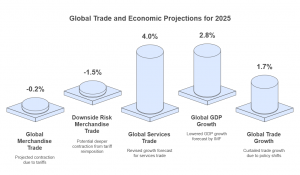AI vs. Tariffs in Global Trade: New 2025 Report Details AI Mitigation for Soaring Costs & Trade Contraction
global trade landscape faced a shock in early 2025, caught in the crosscurrents of aggressive tariff regimes and the transformative power of (AI).
LONDON, UNITED KINGDOM, May 8, 2025 /EINPresswire.com/ -- The global trade landscape faced a seismic shock in early 2025, caught in the crosscurrents of aggressive tariff regimes and the transformative power of Artificial Intelligence (AI). A critical new analysis by Meridian Research, titled "Navigating the Nexus: AI, Tariffs, and the Future of Global Trade in 2025," provides essential data and strategic insights into this volatile environment. The study highlights a policy-driven trade contraction that challenges businesses worldwide, while simultaneously revealing AI's crucial role in adaptation and resilience.At a Glance: Critical Datapoints from the 2025 Trade Nexus Report:
• Global Merchandise Trade Volume: Projected -0.2% contraction in 2025 (downside risk to -1.5%), a reversal from +2.9% in 2024.
• US Average Effective Tariff Rate (AETR): Jumps from 2.2% (2024) to 7.1%-17.0% under 2025 scenarios.
• Peak US AETR (Post-April Actions): Estimated between 11.3% and 23% by various analyses, highest levels since the 1930s/40s.
• China Tariff Rate: Escalated to a potential 125-145% baseline under the reciprocal regime.
• AI in Logistics Market Growth: Forecast CAGR of 45.93% (2024-2032), potentially reaching US$348.62 billion.
• AI's Potential Global Economic Contribution: Up to US$19.9 trillion by 2030.
• AI-Driven Logistics Cost Reduction: Estimated up to 15% overall.
• AI Route Optimization: Reduces fuel costs by 15% and improves on-time delivery by 20%.
• AI Warehouse Efficiency: Increases efficiency by 30% and cuts order processing times by 50%.
• AI Inventory Reduction: Lowers inventory levels by 20-35%.
• Mexico Trade Status: Surpassed China to become the top US trading partner in early 2025.
• Projected US Job Impact: Estimated 671,000 to 770,000 fewer US jobs due to 2025 tariffs.
• Projected US Household Cost: Average purchasing power loss of $3,800-$4,900 annually (pre-substitution).
• Projected Global GDP Impact: Cumulative reduction of ~0.8 percentage points (IMF, 2025-2026) due to tariffs.
• AI ROI in Supply Chains: 46% of supply chain leaders report achieving ROI from AI investments.
Key Findings: A New Trade Paradigm Emerges
Beyond the headline statistics, the Meridian Research report identifies several critical findings shaping the future of global trade:
• Policy Over Macroeconomics: The 2025 trade downturn is primarily attributed to tariff actions and policy uncertainty, overriding previously favourable macroeconomic drivers.
• AI as a Counterforce: While tariffs create friction, AI offers significant potential to enhance efficiency, reduce costs, and build supply chain resilience. However, its impact is moderated by adoption challenges and regulatory hurdles.
• Trade Flow Realignment: Tariffs are actively rerouting global trade, diminishing direct US-China flows and creating opportunities for alternative hubs like Mexico, Vietnam, and India.
• Complex AI-Tariff Dynamics: AI acts as both a mitigation tool (optimizing logistics, automating compliance ) and an enforcement aid for customs authorities. Fragmented data flow rules pose a significant challenge to AI's effectiveness.
• Sectoral Vulnerability & Opportunity: Industries like Automotive and Electronics face acute pressure, while AI presents new competitive avenues, especially for SMEs navigating complexity.
• Accelerated GVC Restructuring: The tariff shocks intensify the push for supply chain resilience through diversification, nearshoring, and friend-shoring.
Leveraging AI in the New Trade Era
"The speed and scope of the 2025 tariff actions created immediate operational and strategic challenges," notes Lead Analyst at Meridian Research. "Our analysis shows that companies strategically deploying AI – for compliance automation, predictive supply chain management, and sophisticated risk assessment – are demonstrably better equipped to navigate this uncertainty. Understanding this AI-tariff nexus is no longer optional; it's fundamental to future success."
The report provides detailed analysis of AI applications, sectoral impacts, regional dynamics, future scenarios, and actionable strategic recommendations for businesses.
Order Your Comprehensive Report Package Now: Navigating the Nexus: AI, Tariffs, and the Future of Global Trade - Research Report
The complete intelligence package includes:
• Full 140-Page Analytical Report: In-depth data, analysis, forecasts, and strategies.
• Executive 60-Page Presentation Deck: Key findings and visuals, ready for briefings.
• 15-Minute Audio Summary: Core research takeaways for efficient understanding.
• 30 Page Presentation: United-States-Tariff-Exemptions as of May 7 2025
About Meridian Research
With specialized expertise in the intersection of AI and global market dynamics, Meridian Research offers comprehensive, data-rich research and insights. Armed with robust datasets, in-depth primary research, and unique perspectives, we provide the intelligence needed to stay ahead in a complex global environment
Meridian Research
info|meridianresearch.co| |info|meridianresearch.co
Mary Lang
Legal Disclaimer:
EIN Presswire provides this news content "as is" without warranty of any kind. We do not accept any responsibility or liability for the accuracy, content, images, videos, licenses, completeness, legality, or reliability of the information contained in this article. If you have any complaints or copyright issues related to this article, kindly contact the author above.
Ivey Engineering Awards $1,000 Scholarship to Mission University Student Gavin Hall
Augusta Precious Metals Reviews, Fees, Complaints, and Gold IRA Analysis Released
Veteran IT Leader Will Decatur Joins MET Florida Board
Więcej ważnych informacji
 Jedynka Newserii
Jedynka Newserii

 Jedynka Newserii
Jedynka Newserii

Konsument

Grupa nowych biednych emerytów stale się powiększa. Ich świadczenie jest znacznie poniżej minimalnej emerytury
Przybywa osób, które z powodu zbyt krótkiego czasu opłacania składek pobierają emeryturę niższą od minimalnej. Tak zwanych nowych biednych emerytów jest w Polsce ok. 430 tys., a zdecydowaną większość grupy stanowią kobiety – wskazują badania ekspertów Instytutu Pracy i Spraw Socjalnych. W ich przypadku krótszy okres składkowy zwykle wynika z konieczności opieki nad dziećmi lub innymi osobami w rodzinie. Wśród innych powodów, wymienianych zarówno przez panie, jak i panów, są także praca za granicą lub na czarno oraz zły stan zdrowia.
Media i PR
M. Wawrykiewicz (PO): Postępowanie z art. 7 przeciw Węgrom pokazało iluzoryczność tej sankcji. Unia wywiera naciski poprzez negocjacje nowego budżetu

Przykład Węgier pokazał, że procedura z artykułu 7 traktatu o UE o łamanie praworządności nie ma mocy prawnej z powodu braku większości, nie mówiąc o jednomyślności wśród pozostałych państw członkowskich. Negocjacje nowego budżetu UE to dobry pretekst do zmiany sposobu części finansowania z pominięciem rządu centralnego. Czerwcowy marsz Pride w Budapeszcie pokazał, że część społeczeństwa, głównie stolica, jest przeciwna rządom Viktora Orbána, ale i na prowincji świadomość konsekwencji działań Fideszu staje się coraz większa przed przyszłorocznymi wyborami.
Firma
Blockchain zmienia rynek pracy i edukacji. Poszukiwane są osoby posiadające wiedzę z różnych dziedzin

Zapotrzebowanie na specjalistów od technologii blockchain dynamicznie rośnie – nie tylko w obszarze IT, ale również w administracji, finansach czy logistyce. Coraz więcej uczelni wprowadza programy związane z rozproszonymi rejestrami, które wyposażają studentów w umiejętności odpowiadające wymogom rynku.
Partner serwisu
Szkolenia

Akademia Newserii
Akademia Newserii to projekt, w ramach którego najlepsi polscy dziennikarze biznesowi, giełdowi oraz lifestylowi, a także szkoleniowcy z wieloletnim doświadczeniem dzielą się swoją wiedzą nt. pracy z mediami.


![Nestlé w Polsce podsumowuje wpływ na krajową gospodarkę. Firma wygenerowała 0,6 proc. polskiego PKB [DEPESZA]](https://www.newseria.pl/files/1097841585/fabryka-nesquik_1,w_85,r_png,_small.png)






.gif)

 |
| |
| |
|